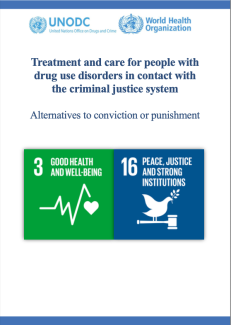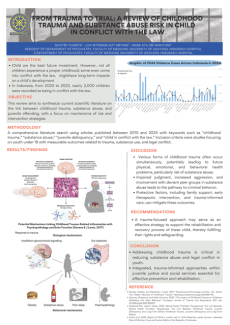Community-based treatment, care, and supervision for people with substance use problems who are involved with the justice system.
Reduce Drug Related Crime
Tussi (“Pink Cocaine”) in Medellín: Availability, Delivery Methods, and Overdose Risks
This field brief presents harm reduction education tools and real-world overdose response guidance related to Tussi (“pink cocaine”) in Medellín, Colombia. It includes infographics on overdose signs, legal consequences, and price–risk misconceptions — suitable for outreach, treatment providers, and public health education.
Treatment and Care for People with Drug Use Disorders in Contact with the Criminal Justice System
The UNODC and WHO report Treatment and care for people with drug use disorders in contact with the criminal justice system: Alternatives to conviction or punishment examines how health-centred, evidence-based responses can be integrated...

International Consortium of Universities for Drug Demand Reduction
This presentation was featured at Indonesia 2025, on the 17.09.2025.
Novel approaches to prevent the recruitment and participation of young people in European drug markets
Objective: This webinar aims to explore innovative and evidence-informed approaches to preventing the recruitment and involvement of young people in drug markets across Europe. Drawing on interventions implemented in various European countries, the session will examine how these strategies can disrupt pathways into drug-related criminality and offer meaningful alternatives for at-risk young people.
Ilicit Trafficking Nexus: Ilicit Drugs, Human Trafficking, and Arms Trade in Asia
Panel Presented at Indonesia 2025 on the 18th of September 2025 Author: Augus Irianto Abstract: The escalating drug problem in Asia has evolved into a multidimensional threat that extends far beyond public health. Illicit drug trafficking...
Day 2, 08:00 - 09:00, Plenary 6: Reducing Drug-Related Crime in Asia
Panel Presented at Indonesia 2025 on the 18th of September 2025 Moderator: Michele Worobiec Presentations: Tery Zakier Muslim: Reducing Drug-Related Crime Grace Sopacua: The Situation of Drugs Law Enforcement in Indonesia Augus Irianto...
Day 1, 16:00 - 17:30, Plenary 4: Reducing Drug Related Crimes in the Community
Panel Presented at Indonesia 2025 on the 17th of September 2025 Moderator: Imelda Indriyani Presentations: Mirza Hapsari Massarapa: Reducing Drug-Related Crime: A Comprehensive Approach from the Indonesian Directorate General of Corrections...
From Trauma to Trial: A Review of Childhood Trauma and Substance Abuse Risk in Child in Conflict with the Law
Introduction. Child in conflict with the law often present with complex psychosocial backgrounds, prominently featuring histories of childhood trauma. Emerging evidence suggests a strong correlation between early traumatic experiences and...

Drug Treatment Courts: An Evidence-Based Review with Recommendations for Improvement
This policy brief by the Canadian Centre on Substance Use and Addiction critically evaluates the role and effectiveness of Drug Treatment Courts (DTCs) in Canada. DTCs are intended to divert individuals with substance use disorders (SUDs)...
NIJ’s Courts Research: Examining Alternatives to Incarceration for Veterans and Other Policy Innovation
This article presents key studies from the National Institute of Justice’s (NIJ) Courts Research Portfolio that examine pretrial, prosecution, and sentencing policies promoting alternatives to incarceration, such as Veterans Treatment...
